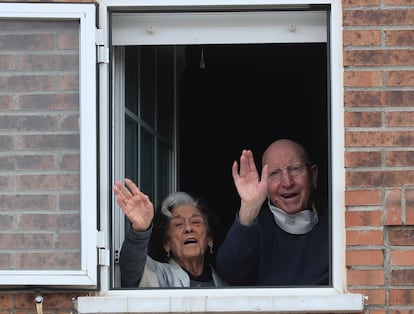The 88-year-old Spanish couple who defeated the coronavirus together
Side by side in hospital, Guadalupe and José were able to defeat Covid-19, which claims 22.2% of patients in their age bracket

It’s been 70 years since José Prieto Cerrudo got on a mule at the Valdelageve fiestas in Salamanca, in northwestern Spain. He and his brother had come to the village from Béjar, 30 kilometers away, to earn some money busking – he played the clarinet; his brother the cymbals. When José saw the mule, he got on it to impress Guadalupe Matas Hernández, who was at the fair with a friend. “The mule is called Cana, and it’s mine,” she told him. The mule then ran forward and ducked its head so that José sailed over the top and landed in a heap.
That was how Guadalupe and José first met. This led to walks together, followed by letters when Guadalupe, like many women in her village, went to work for a family in Madrid. Finally, in 1955, the pair married and had their first daughter, then a second and a third and so on as they tried for a boy. “Look at what you’ve got us into, all for the sake of a boy,” said Guadalupe in 1971, after giving birth to seven girls.
They missed each other; they don’t know how to be apartCouple’s daughter, Rosi
Last month, José and Guadalupe gave these daughters – Maite, Rosi, Irene, María José, Pilar, Maika and Bea – a shock when they were both hospitalized for Covid-19. But on March 30, they returned home to ViIlanueva de la Torre in the province of Guadalajara, having defeated the illness together, despite the fact that, at 88, they are in an age bracket with a 22.2% mortality rate, and that José had suffered a stroke in 2012, which put him at greater risk.
It was José who raised the alarm on March 4 after suffering an unusually persistent cough. “The next day I took him to the doctor and he was prescribed antibiotics,” says the couple’s daughter, Rosi.
On March 8, there was a big family party in the Prieto-Matas household as Guadalupe and José celebrated their 65th wedding anniversary. But several days later, José had developed a fever and headache. He was admitted to the Red Cross hospital in Madrid on March 14. José had tested positive for the coronavirus.
Not wanting to be alone, Guadalupe moved in with one of her daughters in Madrid, where she began to show the same symptoms as her husband. She tested positive for coronavirus and was admitted to the same Red Cross hospital, though on a separate floor. “They missed each other; they don’t know how to be apart,” says Rosi. “Especially my father. He is very affectionate. He needs her with him.”
This is a very hardy generation which has overcome everything from a civil war to hunger, misery and the death of brothers and sistersJavier Gómez Pavón, the head of geriatrics department at the Red Cross hospital in Madrid
José asked if Guadalupe could be moved to his room and his doctor, Jesús Lacasa, agreed. If both or one of the patients is critical, it is better to keep them apart as it can be devastating if they eventually have to be separated. But this was not the case. “When they are in different rooms, they are thinking about their partner all the time,” says Lacasa. “These are couples who have been together all their lives. They are aware that the other is unwell. They don’t even care about themselves, just about the other, and not knowing how they are makes them desperate. Our policy is to bring them together as long as it is not a risk to their state of health. In this case, Guadalupe was better and more active than José.” So much so that when she was ready to be discharged, she said she would only go if she could go with him.
Most elderly patients can recover, but to what extent? “If the person is returning to a family environment, or to their partner, where nothing has changed, they will bounce back stronger and happier because they are back where they belong,” says Javier Gómez Pavón, the head of geriatrics department at the Red Cross hospital. “This is a very hardy generation which has overcome everything from a civil war to hunger, misery and the death of brothers and sisters.”
Over the last few days, the Red Cross hospital has discharged dozens of seniors, including María Milagros Martín Diez, 78, Joaquina Canela García, 80, Rufina García Bardera, 90, Felipe Mata García, 87, and Manuel Monguell Rivas, 80.
Also on the list is Adoración González García, a 96 year old from Sisterna in the northwestern region of Asturias. The widow of Manuel Gavela and mother of Ramón, Antonio and Mari Carmen, Adoración was a healthy, active woman before catching the virus, and was still going to the gym until a few years ago. A few weeks ago, she fell from her bed at the senior home where she lives and was taken to the emergency room, where she tested positive for Covid-19.
Over the last few days, the Red Cross hospital has discharged dozens of seniors
The coronavirus mortality rate for people over the age of 90 is 26.7%. But Adoración is made of stern stuff. In 1948, she and her husband came without a cent to Madrid, where she raised her three children and set up her own hairdressing salon on Extremadura Avenue, called Peluquería Dora. “They prepared us for the worst,” says her son Ramón. “There was a big chance that she wouldn’t make it. But she has always been healthy. Our father also died very old – the age she is now.” Adoración is now back in the senior care home and in quarantine waiting to see her family.
Meanwhile, José and Guadalupe are self-isolating on the top floor of their home, though they managed to get to the window to pose for a photo for EL PAÍS. “We also thought that things might not go well, especially because my father was already in a bad way. But they can do it [defeat the virus], of course they can: most of them can,” says Rosi.
When José married Guadalupe, they went to live with his parents and eight siblings. Then he went to Madrid where he found work at the Madrid-Barajas airport as a signalman and baggage handler on the recommendation of an uncle. He also sold clothes and gold. “He worked all his life at whatever it took to get us ahead. He went out and she stayed in because Mom had to take care of all seven of us,” says Rosi, who would remind her parents at family dinners that they should have stopped at daughter number two. “That happens to be me,” she says. “The third one says that three would have been the perfect number. And the fourth one thinks four would have been enough…”
English version by Heather Galloway.
Tu suscripción se está usando en otro dispositivo
¿Quieres añadir otro usuario a tu suscripción?
Si continúas leyendo en este dispositivo, no se podrá leer en el otro.
FlechaTu suscripción se está usando en otro dispositivo y solo puedes acceder a EL PAÍS desde un dispositivo a la vez.
Si quieres compartir tu cuenta, cambia tu suscripción a la modalidad Premium, así podrás añadir otro usuario. Cada uno accederá con su propia cuenta de email, lo que os permitirá personalizar vuestra experiencia en EL PAÍS.
¿Tienes una suscripción de empresa? Accede aquí para contratar más cuentas.
En el caso de no saber quién está usando tu cuenta, te recomendamos cambiar tu contraseña aquí.
Si decides continuar compartiendo tu cuenta, este mensaje se mostrará en tu dispositivo y en el de la otra persona que está usando tu cuenta de forma indefinida, afectando a tu experiencia de lectura. Puedes consultar aquí los términos y condiciones de la suscripción digital.









































